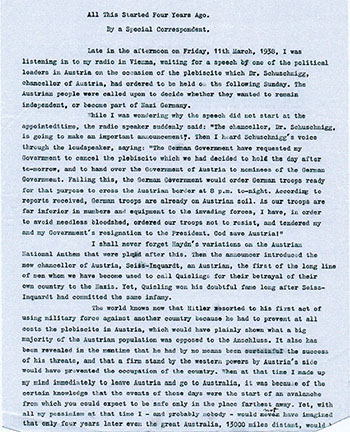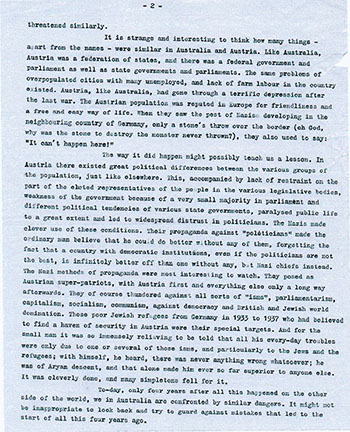Brief Answers to the Big Questions - Stephen Hawking

Permalink - Comments - Tags: Books
Frederick Douglass: Prophet of Freedom - David W. Blight

Permalink - Comments - Tags: Books
City of Thieves - David Benioff

Permalink - Comments - Tags: Books
Say Nothing - Patrick Radden Keefe

Permalink - Comments - Tags: Books
All This Started Four Years Ago - By a Special Correspondent
This article by "A Special Correspondent" was in my grandfather's papers, along with other letters written at the time on what I believe is the same typewriter (something I'd love to be able to confirm). I haven't been able to find this text elsewhere so I am publishing it here.
Chilling given the recent resurgence of Nationalist rhetoric.


Late in the afternoon on Friday, 11th March, 1938, I was listening in to my radio in Vienna, waiting for a speech by one of the political leaders in Austria on the occasion of the plebiscite which Dr. Schuschnigg, chancellor of Austria, had ordered to be held on the following Sunday. The Austrian people were called upon to decide whether they wanted to remain independent, or become part of Nazi Germany.
While I was wondering why the speech did not start at the appointed time, the radio speaker suddenly said: "The chancellor, Dr. Schuschnigg, is going to make an important announcement. Then I heard Schuschnigg's voice through the loudspeaker, saying "The German Government have requested my Government to cancel the plebiscite which we had decided to hold the day after to-morrow, and to hand over the Government of Austria to nominees of the German Government. Failing this, the German Government would order German troops ready for that purpose to cross the Austrian border at 8 p.m. to-night. According to reports received, German troops are already on Austrian soil. As our troops are far inferior in numbers and equipment to the invading forces, I have, in order to avoid needless bloodshed, ordered our troops not to resist, and tendered my and my Government's resignation to the President. God save Austria!"
I shall never forget Haydn's variations on the Austrian National Anthem that were played after this. Then the announcer introduced the new chancellor of Austria, Seiss-Inquardt, an Austrian, the first of the long line of men whom we have become used to call Quislings for their betrayal of their own country to the Nazis. Yet, Quisling won his doubtful fame long after Seiss-Inquardt had committed the same infamy.
The world knows now that Hitler resorted to his first act of using military force against another country because he had to prevent at all costs the plebiscite in Austria, which would have plainly shown what a big majority of the Austrian population was opposed to the Anschluss. It also has been revealed in the meantime that he had by no means been certain of the success of his threats, and that a firm stand by the western powers by Austria's side would have prevented the occupation of the country. When at that time I made up my mind immediately to leave Austria and go to Australia, it was because of the certain knowledge that the events of those days were the start of an avalanche from which you could expect to be safe only in the place farthest away. Yet, with all my pessimism at that time I - and probably nobody - would not have imagined that only four years later even the great Australia, 13000 miles distant would be threatened similarly.
It is strange and interesting to think how many things - apart from the names - were similar in Australia and Austria. Like Australia, Austria was a federation of states, and there was a federal government and parliament as well as state governments and parliaments. The same problems of overpopulated cities with many unemployed, and lack of farm labour in the country existed. Austria, like Australia, had gone through a terrific depression after the last war. The Austrian population was reputed in Europe for friendliness and a free and easy way of life. When they saw the pest of Nazism developing in the neighbouring country of Germany, on a stone's throw over the border (oh God, why the stone to destroy the monster never thrown?), they also used to say: "It can't happen here!"
The way it did happen might possibly teach us a lesson. In Austria there existed great political differences between the various groups of the population, just like elsewhere. This, accompanied by lack of restraint on the part of the elected representatives of the people in the various legislative bodies, weakness of the government because of a very small majority in the parliament and different political tendencies of various state governments, paralysed public life to a great extend and led to widespread distrust in politicians. The Nazis made clever use of these conditions. Their propaganda against "politicians" made the ordinary man believe that he could do better without any of them, forgetting the fact that a country with democratic institutions, even if the politicians are not the best, is infinitely better of than one without any, but Nazi chiefs instead. The Nazi methods of propaganda were most interesting to watch. They posed as Austrian super-patriots, with Austria first and everything else only a long way afterwards The Nazi methods of propaganda were most interesting to watch. They posed as Austrian super-patriots, with Austria first and everything else only a long way afterwards. The of course thundered against all sorts of "isms", parliamentarism, capitalism, socialism, communism, against democracy and British and Jewish world domination. Those poor Jewish refugees from Germany in 1933 to 1937 who had believed to find a haven of security in Austria were their special targets. And for the small man it was so immensely relieving to be told that all his every-day troubles were only due to one or several of those isms, and particularly to the Jews and the refugees; with himself, he heard, there was never anything wrong whatsoever; he was of Aryan descent, and that alone made him ever so far superior to anyone else. It was cleverly done, and many simpletons fell for it.
To-day, only four years after all this happened on the other side of the world, we in Australia are confronted by similar dangers. It might not be inappropriate to look back and try to guard against mistakes that led to the start of all this four years ago.
Permalink - Comments - Tags: World War Two,Misc
[First Page] [Prev] Showing page 8 of 10 pages [Next] [Last Page]
 Mastadon
Mastadon Feeds
Feeds Contribute
Contribute